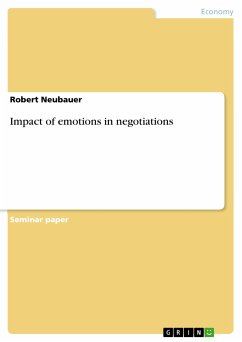Essay from the year 2008 in the subject Business economics - Miscellaneous, grade: 1,3, Catholic University Eichstätt-Ingolstadt, language: English, abstract: With day-to-day meetings and constant communication, the modern business world is changing the ways of interpersonal interaction. Especially in flat hierarchies, negotiations serve an important role in resolving conflict situations and have become a valuable instrument both for managerial and operational decision-making within a corporation. Externally, recurring negotiations with businesspeople around the globe have become a standard. Though negotiation skills are highly needed, many people rely on their experience from former negotiations and never have thought of using certain strategies or methods. Few may have read books on strategies in negotiations and apply them in real negotiating events such as compensation bargaining, promotions or business meetings. It is becoming increasingly important to be able to adapt to various negotiation settings, such as differing power among participants, external and internal negotiations and short- or long-term negotiations as well. A good negotiator knows what patterns of behavior to induce in others by using emotions as a tool to reach his goal. While there are some promising approaches, which can help to realize increased joint gains, many exclude emotions as an important way of carrying information. You may even find advice (esp. in the pre-1990s) proposing to avoid the use of emotions, either intrapersonal or interpersonal. The lack of research in this field has been covered since then and is progressing at a high pace. The following essay introduces the most prevalent and important emotions in negotiations and gives useful tips on how to capitalize on both the negative and positive effects of emotions such as fear, anger and envy. This is done both on an intrapersonal as well as an interpersonal level. Ultimately, the EASI model is presented, which provides a universal approach for strategies and tactics regarding emotions which are not necessarily covered here, but also play an important role in negotiations.
Hinweis: Dieser Artikel kann nur an eine deutsche Lieferadresse ausgeliefert werden.
Hinweis: Dieser Artikel kann nur an eine deutsche Lieferadresse ausgeliefert werden.









